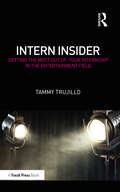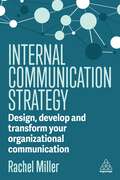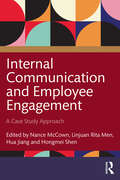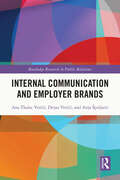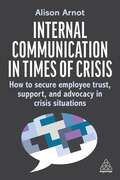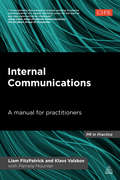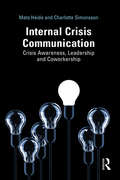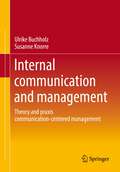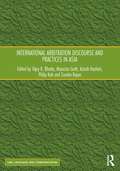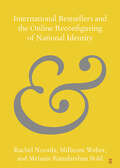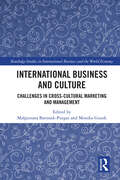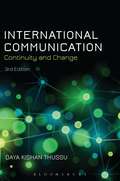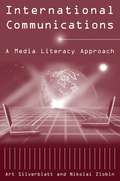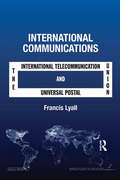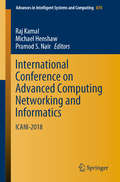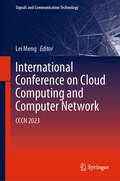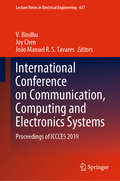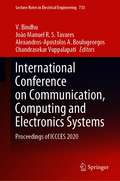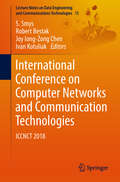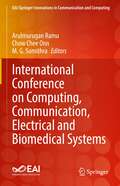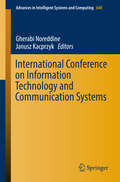- Table View
- List View
Intern Insider: Getting the Most Out of Your Internship in the Entertainment Field
by Tammy TrujilloInternships have all but became a requirement when starting out in the fields of entertainment and broadcasting. Students need these internships not only to get their foot in the door, but to gain valuable experience that gives them an advantage when going for that first job in the industry. Intern Insider helps students navigate the often daunting task of finding an internship, and equips readers to use the experience learned to begin a strong career in the entertainment world. As both a professional broadcaster and college professor, author Tammy Trujillo approaches the topic of internships from both sides: what the student and intern site hope to gain. She provides various valuable perspectives throughout the book, including student assessments on their internship experiences, case studies of those who have turned their internships into careers, and interviews with internship site coordinators. Her breadth of knowledge and experience make for a ground-level book both informative and useful. In the competitive landscape of today’s entertainment and broadcasting worlds, Intern Insider provides students with all the tools they need to make the most of their internships and jumpstart their careers!Also visit http://www.interninsider-thebook.com/
Internal Communication Strategy: Design, Develop and Transform your Organizational Communication
by Rachel MillerGetting internal communication right starts with having a clear strategy. Internal Communication Strategy is your all-in-one guide to designing, developing and delivering an effective internal communication strategy that will inspire and motivate your employees. Written by award-winning communications professional Rachel Miller and featuring key insights from companies such as Marks & Spencer, Hilton, BBC and The Met Office, this book covers not only how to develop and write an internal communication strategy, but also how to practically implement it throughout your organization to create a shared understanding and vision. With workplaces constantly evolving, this book gives you a solid framework to return to when you need to refresh your strategy, providing actionable guidance and inspirational insights throughout. Drawing on the author's 20 years of experience, it also tackles the key topics facing communicators today including communicating with neurodivergent employees, how to influence at C-suite level, the effect of hybrid working and how to measure the impact and prove the value of internal communication.
Internal Communication and Employee Engagement: A Case Study Approach
by Linjuan Rita Men Nance McCown Hua Jiang Hongmei ShenThis book aims to explore the connection between internal communication and employee engagement in both educational and business settings. Through the collection of chapters contributed by leading public relations, communication, and management scholars as well as seasoned practitioners, readers will gain new insights into current issues in internal communication and employee engagement through a series of real-world case studies analyzing current issues and offering best practices in internal communication and employee engagement in specific industry and organization settings. Learning outcomes and discussion questions for both classroom use and business strategizing round out each chapter, providing a springboard to further inquiry, research, and initiative development in these intricately intertwined areas so crucial to employee satisfaction and organizational success. This makes Internal Communications and Employee Engagement an ideal resource for the intended audience of scholars, students, internal communication managers, and organizational leaders
Internal Communication and Employer Brands (Routledge Research in Public Relations)
by Dejan Verčič Ana Tkalac Verčič Anja ŠpoljarićThis book proposes a model of internal communication based on empirical research to demonstrate how contemporary organizations strategize, organize, perform and measure it. Internal communication is the management of communication between an organization and its members to inform, motivate, engage and cocreate meanings to make organizations more effective. The book presents key concepts defining the successful implementation and execution of internal communication: internal communication satisfaction, employee engagement, employer branding, organizational support, and psychological contract fulfillment. Including an extensive literature review and informed by in-depth interviews conducted with corporate communication directors and human resource management directors in 25 Croatian organizations, the book uses original research to give practical guidance on internal communication best practices. The book is an ideal resource for researchers and advanced students of public relations and corporate communication broadly and internal and employee communication specifically.
Internal Communication in Times of Crisis: How to secure employee trust, support and advocacy in crisis situations
by Alison ArnotTraditionally, crisis communication has focused on the needs of the media and other external audiences, yet it is your employees who often face the crisis most directly and who fuel your organization's reputation, resilience and recovery. Internal Communication in Times of Crisis will help you unlock the power of internal communication to guide your organization through crisis and back to business as usual with confidence and care. Written by expert communications trainer and consultant Alison Arnot, this comprehensive guide covers all aspects of internal crisis communication. This book explains how to meet a full range of human and organizational internal crisis communication needs as you take a forward-looking approach to keeping employees safe, supported and enabled amid the shock and emotion a crisis brings. Learn how to motivate and empower them with the knowledge needed to deliver a crisis response and inspire them to connect, collaborate and advocate for the organization as you negotiate the path to recovery. Using a mix of theory, practical examples and expert insights, this book helps you understand the different approaches required in different crisis situations. Covering strategic activity such as gathering insight, setting objectives, working with leadership, defining approach and evaluating success together with tactical activity such as crafting messages, selecting channels and addressing concerns, this is the ultimate guide for internal communicators looking to navigate crises with confidence.
Internal Communications
by Liam Fitzpatrick Klavs ValskovGet internal communications right in your organization and the benefits are clear. Motivated staff, better financial performance, a strong external reputation and delighted customers are just a few of the reasons why getting your message over to staff effectively matters.Internal Communications explores what good practice in internal communications looks like, providing a no-nonsense approach to devising an internal communications strategy based on the authors' extensive experiences as consultants and in-house leaders in the private, public and not-for-profit sectors. It provides a step-by-step guide to: -Building an internal communications team and plan -Devising messages and deciding which channels to use - Working with line managers and senior leaders -Researching and evaluating internal communications -Supporting change within an organizationSupported by easy to follow models, example explanations of the core theory, and case studies, Internal Communications provides students and internal communicators alike with the practical tools and advice they need to make a difference in an organization.
Internal Crisis Communication: Crisis Awareness, Leadership and Coworkership
by Mats Heide Charlotte SimonssonWe live in a crisis society, with traditional media responding on a minute-by-minute basis on daily, seemingly inevitable, organizational crises. Whether crises have become more prevalent or we're simply more aware of them, they are now of great concern to organizations and crisis management and communication is a priority. Most organizations have a crisis response plan; many have dedicated crisis and security management staff. Yet much of the emphasis has been on action outside of the organization. Neglecting communication between managers and employees, they risk poor, inconsistent crisis management and the very real possibility of crisis escalation. Crisis management, like charity, begins in the home. Internal Crisis Communication is one of the first guides to communication inside organizations, before, during and after a crisis – not just on the acute crisis phase – to provide a complete and holistic guide for managers that will help them manage and contain crises. It includes an in-depth real-life case study, referred to throughout, from the author's own experience, which makes practical application explicit and the methodology clear. Strengthened by rigorous academic research and tested in real-life crisis situations, the methods included in this book will be invaluable for communication professionals, security officers and crisis managers, as well as valuable reading for students and researchers interested in crisis and risk management.
Internal Marketing: Internal Marketing (University of Tehran Science and Humanities Series)
by Pantea Foroudi Morteza AkbariThere has been a growing interest in the subject of internal marketing: issues and perspectives, principles, foundations and concepts in recent years amongst academics and practitioners because there is a belief that successful and improvement in a competitive market gains through deliver better service to customer (firstly, to internal customers; i.e., employees of organization) and create satisfaction in them which in turn influence consumer patronage and loyalty, and consumer decision-making. The significant role of the internal marketing is to developing and maintaining relationships with the internal stakeholders of a contemporary organisation. There is an extensive belief in today's society on how the company viewed by key stakeholders such as investors and shareholders, consumers and customers (both internal and external), members of the community and employees in which the company resides.The challenge is to explore new and effective ways to harness the power of the communication opportunities it presents to engage with stakeholders in interactive, immediate and innovative ways. Any successful communication campaign will include them in its strategy. We view the study of the relationship between internal marketing, internal and external stakeholders, and companies to be timely topics for further investigation.
Internal Marketing: Your Company's Next Stage of Growth
by William Winston Dennis J CahillFirst published in 1996. Routledge is an imprint of Taylor & Francis, an informa company.
Internal communication and management: Theory and praxis communication-centered management
by Susanne Knorre Ulrike BuchholzThis book on business management combines theoretical knowledge with practical examples Agility and internal communication are two important competencies for modern business management. They should already be taught during studies so that upcoming managers are prepared for the challenges of management tasks at an early stage. This book on corporate management is an excellent tool for teaching current leadership concepts. Especially the combination of theoretical knowledge with practical case studies makes it interesting not only as a basis for exams for students, but also as a reference book for managers in companies. Theoretical knowledge, practically imparted A major strength of this book on business management is its bridge between theoretical knowledge and tips on how to implement practical concepts in businesses. Thus, not only students benefit from the imparted knowledge of this book, but also managers and employees from the following departments: Corporate DevelopmentStrategic controllingLegal and Compliancechange managementhuman resourcesCommunications Management Current scientific discussions on internal communication and agile management are taken up and explained clearly using practical examples. Recent developments in this professional field are included. The book deals with these topics In their book on business management, the authors deal with the following topics, among others: Fundamentals of corporate managementIntroduction to communication-based management theoryPerspectives of internal communication in the context of agile managementTasks of corporate managementFactors of leadership communication, including normative leadership, strategic controlling and innovation managementOutlook for future developments in internal communication
International Academic Staff: The Roles of Languages, Cultures, and Personalities
by Nick Pilcher Kendall Richards Gyung Sook LeeThis book focuses on the experiences of international academic staff in higher education, particularly examining the influences of issues such as languages, cultures, and personalities. The qualitative approach taken by the authors provides vignettes of varied international contexts, which are then compared and analysed to highlight important considerations for practice in different settings. By exploring the experiences of staff teaching within a language that is not their first language, and in a different cultural context, the authors contribute to a burgeoning area of research, and scholars working on Applied Linguistics, Higher Education, English as a Medium of Instruction and other aspects of Internationalisation are likely to find the book relevant and useful.
International Arbitration Discourse and Practices in Asia (Law, Language and Communication)
by Vijay K. Bhatia Maurizio Gotti Azirah Hashim Philip Koh Sundra RajooInternational business exchanges between and with Asian countries have increased enormously over the last few years. As a natural consequence, this has brought about an increasing number of trade disputes that are being resolved through arbitration as an effective alternative to more expensive litigation. This volume offers a variety of perspectives on this important international dispute resolution practice in Asia. Essentially interdisciplinary in approach, it brings together specialists in law, international commercial arbitration and discourse analysis. The contributing authors include practitioners as well as academics. Together they explore the interrelations between discourses and practices in the field of arbitration in Asia. The work also investigates the extent to which the ‘integrity’ of arbitration principles, typical of international commercial arbitration practice, is maintained in various Asian contexts. The authors focus particularly on arbitration norms and practices as they are influenced by local juridical, cultural and linguistic factors. The book will be a valuable resource for academics and practitioners working in the areas of arbitration and dispute resolution, as well as researchers with an interest in language, communication and discourse analysis.
International Bestsellers and the Online Reconfiguring of National Identity (Elements in Publishing and Book Culture)
by Rachel Noorda Millicent Weber Melanie Ramdarshan BoldInternational bestsellers are the ideal sites for examining the complicated relationship between literary culture and national identity. Despite the transnational turns in both literary studies and book history, place is still an important configurer of twenty-first-century book reception. Books are crucial to national identity and catalysts of nationalist movements. On an individual level, books enable readers to shape and maintain their own national identities. This Element explores how contemporary readers' understandings of nation, race/ethnicity, gender, and class continue to shape their reading, using as case studies the online reception of three bestseller titles-Liane Moriarty's Big Little Lies (Australia), Zadie Smith's NW (UK), and Kevin Kwan's Crazy Rich Asians (USA). In doing so, this Element demonstrates the need for and articulates a transnational conceptualisation of the relationship between reader identity and reception.
International Business and Culture: Challenges in Cross-Cultural Marketing and Management (Routledge Studies in International Business and the World Economy)
by Małgorzata Bartosik-Purgat Monika GuzekInternational Business and Culture: Challenges in Cross-Cultural Marketing and Management explores the intricate relationship between culture and business, offering valuable insights for both practitioners and scholars. The authors delve into the profound impact of cultural dimensions on various aspects of international business, marketing, human resource management, and organisational structure. They examine the theoretical frameworks underpinning these studies through a meticulous narrative literature review and case studies.The significance of understanding cultural influences on business decisions becomes paramount in an increasingly interconnected world. The book addresses challenges faced by companies operating across diverse cultures, emphasising the need for adaptation in international marketing and management. Based on practical examples, the research focuses on identifying the most culturally sensitive areas in international business and explores the crucial cultural determinants influencing engagement with foreign markets.The book's theoretical background spans international business, marketing, and management, and it is intertwined with cultural concepts from Hofstede and Hall. It consists of 16 chapters covering marketing and communication strategies across cultures, cultural aspects of international business and cross-cultural management based on practical examples of Duracell, Inc., PepsiCo, Volkswagen, VELUX Group, and Amica Group, among others.The book highlights the undeniable interconnectedness of culture and business. As businesses expand internationally, the symbiotic relationship between culture and business remains a pivotal factor influencing success and growth.
International Communication: A Reader
by Daya Kishan ThussuThis comprehensive Reader brings together seminal texts in media and communication from both traditional as well as more recent scholarship. <p><p> Readings are drawn from an international range of scholars and organized to reflect the growing internationalization of the field, with clearly defined sections covering key aspects of global communication. In addition to the core academic readings, key policy documents are also included to demonstrate the development of the political, economic and technological infrastructure that underpins the global system of media and communication.
International Communication: Continuity and Change
by Daya Kishan ThussuThe third edition of International Communication examines the profound changes that have taken place, and are continuing to take place at an astonishing speed, in international media and communication. Building on the success of previous editions, this book maps out the expansion of media and telecommunications corporations within the macro-economic context of liberalisation, deregulation and privitisation. It then goes on to explore the impact of such growth on audiences in different cultural contexts and from regional, national and international perspectives. Each chapter contains engaging case studies which exemplify the main concepts and arguments.
International Communications: A Media Literacy Approach
by Art Silverblatt Nikolai ZlobinInternational communication affects the way we think about other countries and their people and sets the agenda of issues that face the global community. This book introduces the functions of international communications.
International Communications: The International Telecommunication Union and the Universal Postal Union
by Francis LyallThe International Telecommunication Union (ITU) and the Universal Postal Union (UPU) are the two major international organisations that are involved in the regulation of international communications. The ITU deals with electronic communications including radio. The UPU deals with mail. As such, both organisations are of major importance in modern life. This volume provides an up-to-date analysis of their development from inception to the present as they have responded to technical and political change. It also makes suggestions for the future. The volume will be an invaluable resource for researchers and students, policy-makers, government officials and administrators, and legal staff in telecommunication and postal organisations.
International Conference on Advanced Computing Networking and Informatics: ICANI-2018 (Advances in Intelligent Systems and Computing #870)
by Raj Kamal Michael Henshaw Pramod S. NairThe book comprises selected papers presented at the International Conference on Advanced Computing, Networking and Informatics (ICANI 2018), organized by Medi-Caps University, India. It includes novel and original research work on advanced computing, networking and informatics, and discusses a wide variety of industrial, engineering and scientific applications of the emerging techniques in the field of computing and networking.
International Conference on Cloud Computing and Computer Networks: CCCN 2023 (Signals and Communication Technology)
by Lei MengThis book covers selected and presented papers of CCCN 2023, the International Conference on Cloud Computing and Computer Network which was held in Singapore April 21-23, 2023. CCCN 2023 provides a premier forum for researchers and scholars from multiple disciplines to come together to share knowledge, discuss ideas, exchange information, and learn about cutting-edge research in diverse fields of cloud computing and computer networks. Topics covered in this book contain cloud computing and semantic web technologies, cloud applications in vertical industries, cloud computing architecture and systems, cloud computing models, simulations and designs among others. The content is relevant to academics, researchers, students, and professionals in cloud computing and computer networks.
International Conference on Communication, Computing and Electronics Systems: Proceedings of ICCCES 2019 (Lecture Notes in Electrical Engineering #637)
by João Manuel R. S. Tavares Joy Chen V. BindhuThis book includes high impact papers presented at the International Conference on Communication, Computing and Electronics Systems 2019, held at the PPG Institute of Technology, Coimbatore, India, on 15-16 November, 2019. Discussing recent trends in cloud computing, mobile computing, and advancements of electronics systems, the book covers topics such as automation, VLSI, embedded systems, integrated device technology, satellite communication, optical communication, RF communication, microwave engineering, artificial intelligence, deep learning, pattern recognition, Internet of Things, precision models, bioinformatics, and healthcare informatics.
International Conference on Communication, Computing and Electronics Systems: Proceedings of ICCCES 2020 (Lecture Notes in Electrical Engineering #733)
by João Manuel R. S. Tavares Chandrasekar Vuppalapati V. Bindhu Alexandros-Apostolos A. BoulogeorgosThis book includes high-quality papers presented at the International Conference on Communication, Computing and Electronics Systems 2020, held at the PPG Institute of Technology, Coimbatore, India, on 21–22 October 2020. The book covers topics such as automation, VLSI, embedded systems, integrated device technology, satellite communication, optical communication, RF communication, microwave engineering, artificial intelligence, deep learning, pattern recognition, Internet of Things, precision models, bioinformatics, and healthcare informatics.
International Conference on Computer Networks and Communication Technologies: Iccnct 2018 (Lecture Notes on Data Engineering and Communications Technologies #15)
by S. Smys Robert Bestak Joy Iong-Zong Chen Ivan KotuliakThe book features research papers presented at the International Conference on Computer Networks and Inventive Communication Technologies (ICCNCT 2018), offering significant contributions from researchers and practitioners in academia and industry. The topics covered include computer networks, network protocols and wireless networks, data communication technologies, and network security. Covering the main core and specialized issues in the areas of next-generation wireless network design, control, and management, as well as in the areas of protection, assurance, and trust in information security practices, these proceedings are a valuable resource, for researchers, instructors, students, scientists, engineers, managers, and industry practitioners.
International Conference on Computing, Communication, Electrical and Biomedical Systems (EAI/Springer Innovations in Communication and Computing)
by Chow Chee Onn Arulmurugan Ramu M. G. SumithraThis book presents selected papers from the International Conference on Computing, Communication, Electrical and Biomedical Systems (ICCCEBS 2021), held in March 2021 at KPR College of Engineering and Technology, Coimbatore, Tamil Nadu, India. The conference explores the interface between industry and real-time environments with newly developed techniques in computing and communications engineering. The papers describe results of conceptual, constructive, empirical, experimental, and theoretical work in areas of computing, communication, electrical, and biomedical systems. Contributors include academic scientists, researchers, industry representatives, postdoctoral fellows, and research scholars from around the world.
International Conference on Information Technology and Communication Systems
by Janusz Kacprzyk Gherabi NoreddineThis book reports on advanced methods and theories in two related fields of research, Information Technology and Communication Systems. It provides professors, scientists, PhD students and engineers with a readily available guide to various approaches in Engineering Science. The book is divided into two major sections, the first of which covers Information Technology topics, including E-Learning, E-Government (egov), Data Mining, Text Mining, Ontologies, Semantic Similarity Databases, Multimedia Information Processing, and Applications. The second section addresses Communication Systems topics, including: Systems, Wireless and Network Computing, Software Security and Monitoring, Modern Antennas, and Smart Grids. The book gathers contributions presented at the International Conference on Information Technology and Communication Systems (ITCS 2017) held at the National School of Applied Sciences of Khouribga, Hassan 1st University, Morocco on March 28-29, 2017. This event was organized with the objective of bringing together researchers, developers, and practitioners from academia and industry working in all areas of Information Technology and Communication Systems. It not only highlights new methods, but also promotes collaborations between different communities working on related topics.
